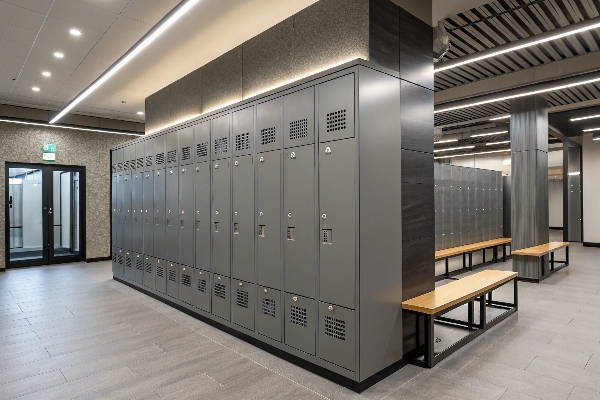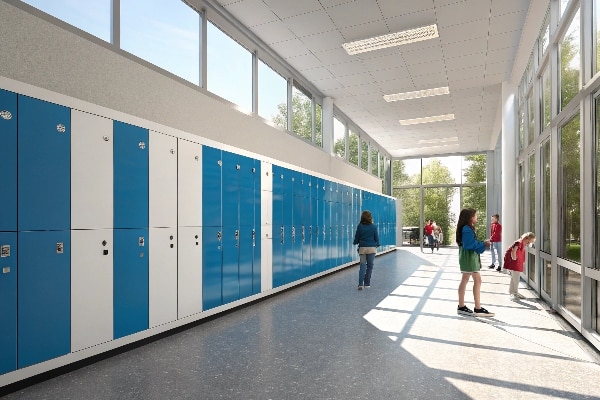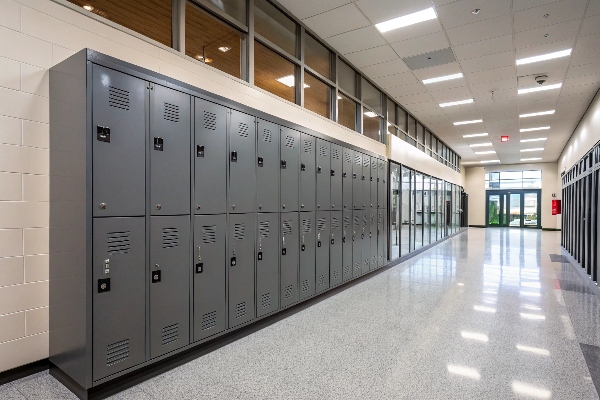
Phenolic lockers are increasingly popular in environments that require high durability and hygiene. But what exactly makes them stand out from other storage solutions?
Phenolic lockers are made from a special resin material known for its strength, durability, and resistance to environmental factors like moisture and fire. They are ideal for high-traffic environments like schools, gyms, and hospitals.
But what exactly makes phenolic lockers different from other materials like plastic? Let’s take a closer look at these key features.
Is phenolic the same as plastic?
Are phenolic lockers just a type of plastic? Let’s take a closer look at their differences.
No, phenolic is not the same as plastic. While both are made from synthetic materials, phenolic lockers use phenolic resin, which is much stronger and more durable than typical plastic.

Phenolic resin is created by polymerizing phenol (a type of organic compound) with formaldehyde under high heat and pressure. This chemical reaction results in a dense, hard material that’s far more durable than plastic. Unlike plastic, which can be easily scratched or deformed, phenolic is resistant to abrasions, impacts, and extreme temperatures. These properties make phenolic lockers an excellent choice for high-use areas, where frequent wear and tear are expected.
Another key difference is how each material reacts to environmental factors. While plastic can degrade under UV light or harsh chemicals, phenolic is resistant to fading and will not warp or become brittle over time. This makes phenolic lockers a more long-lasting and reliable storage solution, especially in demanding conditions.
Additionally, phenolic lockers are non-porous, making them more resistant to moisture and microbial growth compared to plastic. This is especially important in environments like schools, gyms, and hospitals, where cleanliness and hygiene are crucial. The antimicrobial properties of phenolic materials help reduce the growth of bacteria, mold, and mildew, ensuring a cleaner and safer environment for users.
What are the disadvantages of phenol?
Phenolic lockers offer numerous benefits, but are there any drawbacks to consider?
While phenolic lockers have many advantages, they are not without their limitations. The production of phenolic materials can be energy-intensive, and excessive impact can cause cracking or damage.
The main downside of phenolic lockers is their initial cost. Phenolic resin is a high-performance material, and producing it requires more energy compared to plastics or metals. This makes phenolic lockers more expensive upfront, which may be a consideration for those working within a tight budget. However, it’s important to remember that their long lifespan and durability typically offset the initial investment. These lockers are designed to last for decades without significant maintenance, making them a cost-effective choice over the long term.
Another potential drawback is that, while phenolic is durable, it is not entirely indestructible. Excessive impact or forceful abuse can cause cracks or chips in the material. This is a concern in areas where lockers are subjected to heavy physical stress, such as sports complexes or industrial settings. While the material is generally resistant to everyday wear, it’s important to handle phenolic lockers with care to prevent damage.
Additionally, the production of phenolic materials can involve a higher carbon footprint compared to other locker materials like metal or plastic. Although many phenolic lockers are made from recycled materials, the energy used in the manufacturing process can still be considerable. For eco-conscious buyers, it’s important to weigh the environmental impact of production with the sustainability benefits of a longer product lifespan.
Despite these drawbacks, the advantages of phenolic lockers, such as their fire resistance, antimicrobial properties, and exceptional durability, make them an ideal solution for many applications.
What are the different types of lockers?
Lockers come in various shapes and sizes, but what are the different types that can be made from materials like phenolic?
Lockers are available in several types, including single-tier, multi-tier, and specialized options like athletic lockers. Phenolic lockers can be customized to meet specific needs.

When choosing lockers, it’s essential to understand the different types that are available, as each type serves a specific purpose.
-
Single-tier lockers are the most basic design, providing one large compartment for personal storage. These lockers are commonly used in environments where users need to store larger items, such as coats, bags, or gym equipment. In schools or offices, they may serve as individual lockers for students or employees.
-
Multi-tier lockers are designed with multiple smaller compartments stacked vertically. These lockers are often used in environments where space is limited, and each person only needs to store a few personal items, such as in gym locker rooms or public swimming pools. They offer a more compact solution while still providing adequate storage for smaller belongings.
-
Athletic lockers are a specialized type, designed for use in gyms and sports facilities. These lockers are typically built to withstand the high humidity and frequent use associated with fitness environments. They may come with ventilation systems or slotted panels to allow airflow, which helps reduce the buildup of moisture and prevents mold and mildew growth.
-
Specialty lockers are customizable to fit specific needs. These might include lockers with charging ports for electronics, medication lockers in healthcare settings, or lockers with additional security features for high-risk items. The versatility of phenolic lockers allows them to be tailored to meet the needs of various environments.
Each of these locker types can be made from phenolic materials, which add durability and resistance to wear, moisture, and fire. Whether you’re outfitting a school, gym, hospital, or office, phenolic lockers provide a long-lasting and hygienic storage solution.
What is the best material for lockers?
With so many locker materials available, how do you choose the best one for your space?
The best material for lockers depends on the intended use. For environments that require durability, moisture resistance, and hygiene, phenolic lockers are an excellent choice.
When choosing the right material for lockers, it’s important to consider factors such as the environment, the amount of foot traffic, and the level of durability needed. Below is a comparison of different locker materials:
| Material | Key Features | Best For |
|---|---|---|
| Phenolic | Durable, moisture-resistant, antimicrobial, fire-resistant | Schools, gyms, hospitals, high-traffic areas |
| Metal | Strong, secure, cost-effective | Offices, factories, secure storage |
| Plastic | Lightweight, budget-friendly, corrosion-resistant | Locker rooms, low-traffic areas |
| Wood | Aesthetic appeal, customizable finishes | Offices, high-end facilities, design-oriented areas |
-
Phenolic lockers are the best choice for environments where durability, hygiene, and fire resistance are top priorities. They are highly resistant to moisture, mold, and mildew, making them ideal for gyms, swimming pools, and healthcare facilities. Phenolic is also fire-resistant, making it a safer option for public spaces that need to comply with fire safety standards.
-
Metal lockers are strong and secure, making them a great choice for environments like factories, warehouses, or offices where security is a concern. However, they are prone to rust and may require regular maintenance if exposed to moisture. Additionally, metal lockers may not be as hygienic as phenolic options, as they can harbor bacteria if not properly cleaned.
-
Plastic lockers are lightweight and budget-friendly, making them a good choice for low-traffic areas or short-term use. They are corrosion-resistant but may not offer the same level of durability or fire resistance as phenolic lockers. Plastic lockers also have limited aesthetic options compared to phenolic, which can be customized in various colors and finishes.
-
Wood lockers are typically chosen for their aesthetic appeal and ability to blend into design-oriented spaces. They are not as durable or resistant to moisture and fire as phenolic lockers, so they are best suited for environments where the look is more important than durability, such as office buildings or retail spaces.
In conclusion, for environments that require durability, moisture resistance, and fire safety, phenolic lockers are the best material. They provide a long-lasting, hygienic, and eco-friendly solution for high-traffic areas.
Conclusion
Phenolic lockers offer a durable, fire-resistant, and eco-friendly solution for high-traffic areas. With their exceptional longevity and resistance to environmental factors, they are an ideal choice for schools, gyms, hospitals, and more.

